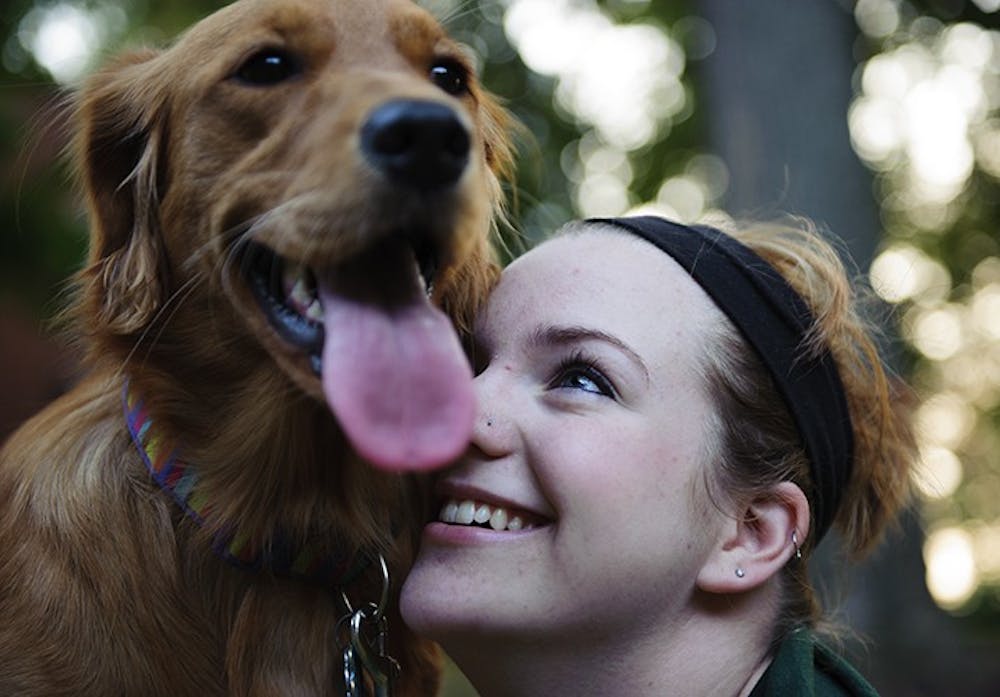Kat Barnett is a normal girl. As a junior studying wildlife and conservation biology, she goes to class and eats at the dining hall like everyone else.
The only difference is that she gets a bit of comfort with her service dog, Roxy, by her side.
Barnett has a medical condition that sometimes requires help from her service dog, and Roxy is still being trained for certain tasks to help Barnett. To protect Barnett’s privacy, the details of her condition have been omitted.
“You can have a service dog for diabetes, seizures, anxiety, depression, autism, any mental health condition, any physical condition, mobility impairment, blind, hearing impaired, anything,” she said.
Since getting Roxy in April, Barnett said she has learned a lot about having a service dog — including the questions people can ask when service dogs are brought into public spaces after having had issues in the past with being kicked out of a restaurant in her hometown.
“Basically, if I go into any public location at all, the only questions that someone is allowed to ask me is, ‘Is your dog a service dog?’ and then ‘What task does it perform?’ ” Barnett said. “So I could say, ‘This is a service dog. Her task is to lick my face.’ And they are not allowed to know why. She does not have to have identification on her. … I’m protected under the (American Disabilities Act). So if she’s with me, she’s protected.”
Barnett said Roxy gives her a consistent schedule to work with, as she also has to take care of Roxy herself.
Carey Busch, assistant dean of Student Accessibility, said service animals on campus have to follow proper grooming, vaccination, medicinal and licensing regulations. Students with service animals can live in residence halls that sometimes have special accommodations for the animals.
The department works with students, helping to find proper housing situations and helping with other departments concerning service animals. Busch said that even with a limited number of service animals and student pairs per year, people should educate themselves and respect those with animals.
“I think etiquette for people with disabilities and service animals is a big topic … especially if (the disability is) not readily apparent, people will tend to get really curious,” Busch said. “I really think (we need) some awareness that we do have students who use service animals for a variety of reasons and we really need to respect that animal and the job they’re doing and that the animal is really there to serve that student.”
Barnett said she understands allergies and if people, or children, have a fear of dogs, she tries to make them feel comfortable. When prompted politely, she said she likes to educate on the different needs met from a service dog and proper service dog etiquette — for example, not petting the animal without permission or distracting it.
“I want people to get rid of the stigma,” she said. “I don’t like the fact that people look at me and I get lots of negative attention from it, and when I walk around campus, people always comment about the dog, stare at the dog. A lot of the time, they’ll just talk to the dog and just completely disregard the fact that I’m in the room.”
Barnett said she knows that those who knew her before Roxy, and helped her through the process, see her for who she is, not for Roxy. One of Barnett’s friends, Amy Karp, a recent graduate of Ohio University, said she has learned a lot about how to behave around service dogs from the duo.
“I really didn’t know that much about service dogs,” Karp said. “I actually learned a lot about the etiquette because I had no idea, like I probably would have went up and pet a service dog.”
But Barnett said she encourages people to respect the task that service dogs have to do — and respect her.
“Because she’s always by my side, people are always staring,” she said. “Sometimes I wish that she was like an invisible service dog. Because then she would still be able to help me but I wouldn’t have people looking.”
@reb_barnes
rb605712@ohiou.edu






